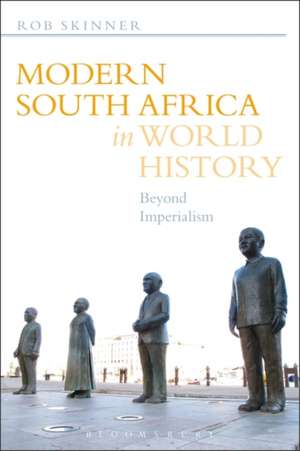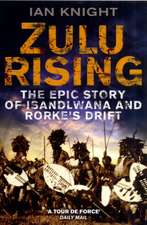Modern South Africa in World History: Beyond Imperialism
Autor Dr Rob Skinneren Limba Engleză Hardback – 3 mai 2017
| Toate formatele și edițiile | Preț | Express |
|---|---|---|
| Paperback (1) | 174.51 lei 3-5 săpt. | |
| Bloomsbury Publishing – 3 mai 2017 | 174.51 lei 3-5 săpt. | |
| Hardback (1) | 538.77 lei 6-8 săpt. | |
| Bloomsbury Publishing – 3 mai 2017 | 538.77 lei 6-8 săpt. |
Preț: 538.77 lei
Preț vechi: 626.47 lei
-14% Nou
Puncte Express: 808
Preț estimativ în valută:
103.10€ • 108.13$ • 85.82£
103.10€ • 108.13$ • 85.82£
Carte tipărită la comandă
Livrare economică 01-15 aprilie
Preluare comenzi: 021 569.72.76
Specificații
ISBN-13: 9781441122728
ISBN-10: 1441122729
Pagini: 216
Dimensiuni: 156 x 234 x 17 mm
Greutate: 0.45 kg
Editura: Bloomsbury Publishing
Colecția Bloomsbury Academic
Locul publicării:London, United Kingdom
ISBN-10: 1441122729
Pagini: 216
Dimensiuni: 156 x 234 x 17 mm
Greutate: 0.45 kg
Editura: Bloomsbury Publishing
Colecția Bloomsbury Academic
Locul publicării:London, United Kingdom
Caracteristici
Draws together imperial, regional and global influences on South African politics, society and culture
Notă biografică
Rob Skinner is Lecturer in Modern History at the University of Bristol, UK, and has written widely on the history of the anti-apartheid and international solidarity movement. He is the author of The Foundations of Anti-Apartheid (2010).
Cuprins
List of Maps 1. Introduction 2. The World of Colonialism 3. Minerals and Modernity 4. Race and Segregation 5. Empire, Nation and War 6. Apartheid and Cold War 7. Liberation Struggles 8. Globalisation and the New South Africa ChronologyNotesIndex
Recenzii
Expands our understanding of the nuances that moulded South Africa. It shows the complex processes that have influenced the vicissitudes that make up South African history ... Skinner has eloquently demonstrated the value of a transnational approach, and the global networks of connections that have moulded this history, which a nationalistic approach fails to appreciate.
A valuable addition to the field. It enhances our understanding of South Africa, especially since the mid-nineteenth century, by viewing it through the lens of transnational and comparative history . [It] is the product of thorough research, is a pleasure to read, and it will be especially helpful for students who wish to understand the country through its interactions with the world.
Skinner (Univ. of Bristol, UK) tries to take the second half of his title-"in world history"-seriously, especially in the first half of this useful, very short synopsis of South Africa from the 19th century to about 2014. In that earlier part of his book, he situates South Africa within global commerce and global human movements, even when the internal history of South Africa might have been more formative. But as he moves his narrative into the segregationist and apartheid 20th century, the real South African story emerges. Skinner sketches as fully as his space allows the contours of emerging Afrikaner populism and racism and, in time, the rise of African nationalism. The clash between these two indigenous, post imperial impulses and the final triumph of the African National Congress led by Nelson Mandela might have been discussed in greater depth, but Skinner's narrative is nevertheless reasonably authoritative. More might have been said about the critical role of the United Democratic Front within the mobilized townships and about the forces that finally propelled Afrikanerdom to retreat. Skinner is weakest on the very modern period. Corruption, so decisive since 2001, is absent, even from the index. Summing Up: Recommended. Most levels/libraries.
Rob Skinner gives us a valuable short account of South Africa's development, from its colonial beginnings to Jacob Zuma. The transnational lens he uses throws new light on South Africa's history in a global context.
Rob Skinner's astute reading of two centuries of South African history rightly places the country in a much broader global context. His thoughtful and reliable guide draws on the latest historical scholarship and fully deserves the attention of students and specialists alike.
A new overview of modern South African history, departing from ideas of isolation and exceptionalism and acknowledging the country's configuration within colonial, imperial, regional and global dynamics, is long overdue. All the more impressive is that Rob Skinner has managed to produce one which also teases out the ways in which its peoples have shaped a unique national society.
This is exactly the book I have been looking for. It offers an accessible and well-research survey of South African history from the colonial period to the present. By interpreting South African history in an international context, the book makes very useful background reading for geography students thinking about the geopolitical significance of apartheid and the international opposition to it.
A valuable addition to the field. It enhances our understanding of South Africa, especially since the mid-nineteenth century, by viewing it through the lens of transnational and comparative history . [It] is the product of thorough research, is a pleasure to read, and it will be especially helpful for students who wish to understand the country through its interactions with the world.
Skinner (Univ. of Bristol, UK) tries to take the second half of his title-"in world history"-seriously, especially in the first half of this useful, very short synopsis of South Africa from the 19th century to about 2014. In that earlier part of his book, he situates South Africa within global commerce and global human movements, even when the internal history of South Africa might have been more formative. But as he moves his narrative into the segregationist and apartheid 20th century, the real South African story emerges. Skinner sketches as fully as his space allows the contours of emerging Afrikaner populism and racism and, in time, the rise of African nationalism. The clash between these two indigenous, post imperial impulses and the final triumph of the African National Congress led by Nelson Mandela might have been discussed in greater depth, but Skinner's narrative is nevertheless reasonably authoritative. More might have been said about the critical role of the United Democratic Front within the mobilized townships and about the forces that finally propelled Afrikanerdom to retreat. Skinner is weakest on the very modern period. Corruption, so decisive since 2001, is absent, even from the index. Summing Up: Recommended. Most levels/libraries.
Rob Skinner gives us a valuable short account of South Africa's development, from its colonial beginnings to Jacob Zuma. The transnational lens he uses throws new light on South Africa's history in a global context.
Rob Skinner's astute reading of two centuries of South African history rightly places the country in a much broader global context. His thoughtful and reliable guide draws on the latest historical scholarship and fully deserves the attention of students and specialists alike.
A new overview of modern South African history, departing from ideas of isolation and exceptionalism and acknowledging the country's configuration within colonial, imperial, regional and global dynamics, is long overdue. All the more impressive is that Rob Skinner has managed to produce one which also teases out the ways in which its peoples have shaped a unique national society.
This is exactly the book I have been looking for. It offers an accessible and well-research survey of South African history from the colonial period to the present. By interpreting South African history in an international context, the book makes very useful background reading for geography students thinking about the geopolitical significance of apartheid and the international opposition to it.









